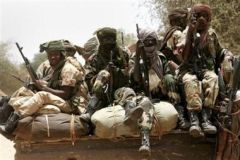Govt, rebels fighting resumes in eastern Chad
Sept 21, 2006 (NDJAMENA) — Columns of soldiers, helicopter gun-ships and tanks have been blasting rebel strongholds in eastern Chad this week, military sources said.
 A Chadian military official contacted by IRIN said government forces attacked rebels on Tuesday at Hadjer Marfaine, which lies between the towns of Adre and Birak close to the Sudan border, and at Moudeina. The official spoke on condition of anonymity.
A Chadian military official contacted by IRIN said government forces attacked rebels on Tuesday at Hadjer Marfaine, which lies between the towns of Adre and Birak close to the Sudan border, and at Moudeina. The official spoke on condition of anonymity.
He also said fighting has continued around Aram Kolle, scene of battles last week between the army and rebels allied with the United Front for Democratic Change (FUC), led by Mahamat Nour.
At Aram Kolle, both sides have already claimed victory. Chadian army Chief of Staff Banyana Kossingar said in a national radio address that the army “dislodged” the rebels. But FUC spokesperson Laona Gong Raoul told IRIN: “We have been dislodged… but we are still at Aram Kolle.”
Mahamt Inee, spokesperson for a coalition of rebel movements fighting under the Rally of Democratic Forces (RAFD), confirmed the official’s report of fighting at Hadjer Marfaine.
“We were attacked by two columns of government troops on 19 September, but we repelled them,” Inee told IRIN by satellite telephone from eastern Chad. He said the rebels took 43 government soldiers prisoner, and seized 40 jeeps and trucks and two tanks.
Chad’s government has been fighting sporadically with rebels opposed to President Idriss Deby for more than a year. Fighting early in the year fell off in May, allowing the rebels to regroup, analysts say.
An agreement signed between Chad and Sudan in August to reestablish diplomatic relations also committed both to begin expelling rebel groups from their territories.
An absence of independent sources in the remote, desert region makes confirmation of events difficult. Since early in the week, the only information provided on the fighting has been by the rebels and Chadian military sources speaking unofficially.
Splinter rebel groups have emerged since efforts to block presidential elections in May failed. Deby was returned to power for a third term, further complicating the situation.
President Deby has been based in the eastern military and aid hub Abeche for the last 10 days, reportedly flying around the region by helicopter to personally oversee the offensives.
Deby’s presence reflects a significant boost in the military’s confidence since it last fought the rebels in April. Witnesses also reported seeing presidential guards fleeing the presidency after rebels who had vowed to overthrow Deby reached Abeche’s outskirts. The attack was subsequently repelled.
RUFD spokesman Inee confirmed news reports that French Mirage fighter jets stationed in Abeche as part of a France-Chad military cooperation treaty have been making surveillance runs over rebel positions.
In April, French fighters dropped bombs close to rebel columns, which French officials said were “warning shots”. Then, too, French jets provided surveillance to Chad’s army.
On Monday, Timane Edrimi, head of the RUFD, warned that all French citizens would become targets of the rebels if France continued to support the Chadian army. “All French citizens, military or civil, that fall into the hands of our combatants will be considered like mercenaries and treated accordingly,” he said.
The threats against foreigners will further raise tension among aid workers operating in eastern Chad, who have been working in an increasingly dangerous environment as attacks against individuals, convoys and compounds have become commonplace.
United Nations agencies and dozens of foreign NGOs are operating a dozen refugee camps in eastern Chad housing a quarter million Sudanese who fled fighting in the neighbouring Darfur region of Sudan.
Lawlessness in eastern Chad has forced more than 50,000 people from their homes in the past year. Militias and bandits have attacked villages, massacred Chadian civilians and stolen animals with impunity, human rights groups say.
(IRIN)
